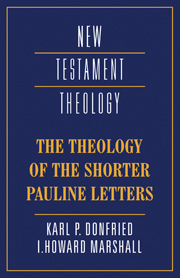Book contents
- Frontmatter
- Contents
- Editor's preface
- List of abbreviations
- THE THEOLOGY OF I THESSALONIANS
- THE THEOLOGY OF 2 THESSALONIANS
- 5 The setting of 2 Thessalonians
- 6 The theology of 2 Thessalonians
- 7 2 Thessalonians and the New Testament
- 8 The significance of 2 Thessalonians for today
- THE THEOLOGY OF PHILIPPIANS
- THE THEOLOGY OF PHILEMON
- Select bibliography
- Indices (Thessalonians)
- Indices (Philippians, Philemon)
6 - The theology of 2 Thessalonians
Published online by Cambridge University Press: 05 June 2012
- Frontmatter
- Contents
- Editor's preface
- List of abbreviations
- THE THEOLOGY OF I THESSALONIANS
- THE THEOLOGY OF 2 THESSALONIANS
- 5 The setting of 2 Thessalonians
- 6 The theology of 2 Thessalonians
- 7 2 Thessalonians and the New Testament
- 8 The significance of 2 Thessalonians for today
- THE THEOLOGY OF PHILIPPIANS
- THE THEOLOGY OF PHILEMON
- Select bibliography
- Indices (Thessalonians)
- Indices (Philippians, Philemon)
Summary
THE GOD OF JUSTICE
The themes of the Thessalonian Christians' election by God and their suffering, both articulated in 1 Thessalonians, find resonance in 2 Thessalonians. In 2 Thess. 2:13 the author gives thanks that ‘God chose you as the first fruits for salvation through sanctification by the Spirit and through belief in the truth.’ If this is a perspective shared by the author and the Thessalonians, then the critical issue that emerges is why, if they have been called by God, must they continue to endure afflictions and intensified persecutions for the sake of the kingdom of God? Is this not rather a sign that they have been abandoned by God? The response that is given to this dilemma is that the ongoing situation and persecution is intended to make them worthy of the kingdom of God and to signal the righteous judgment of God against the afflicters on the last day (2 Thess. 1:5–12). Juridical and apocalyptic concepts are employed in responding to this crisis of faith: in particular, the understanding of God as the God of justice and Jesus as his apocalyptic agent who will vindicate the afflicters and bring comfort to the afflicted.
The theme of the justice of God is specifically articulated in 2 Thess. 1:6. God, as the chief apocalyptic actor, will repay with vengeance those who are persecuting the Thessalonians through the apocalpytic agency of the Lord Jesus at the time of his future revelation with his mighty angels.
- Type
- Chapter
- Information
- The Theology of the Shorter Pauline Letters , pp. 90 - 104Publisher: Cambridge University PressPrint publication year: 1993

